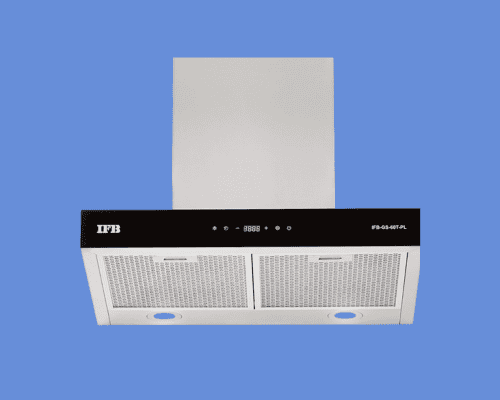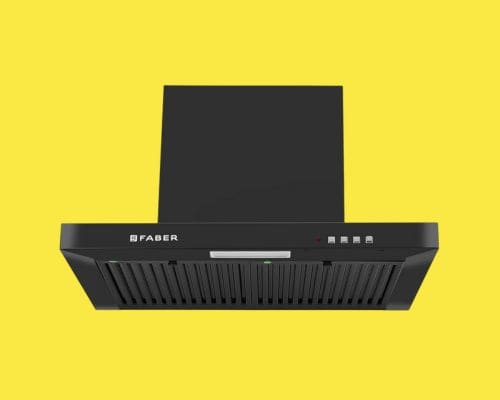Cassette Filter vs Baffle Filter: Which One to Pick?

If you’re planning to buy a kitchen chimney, choosing the right filter is crucial.
The two most common options are cassette filters and baffle filters.
Each has its strengths and limitations depending on your cooking habits, maintenance preferences, and budget.
Today in this comparison guide on: Cassette Filter vs Baffle Filter, I will help you decide which filter chimney suits your kitchen best.
Quick Summery
| If You… | Go With… |
| Cook light meals occasionally | Cassette Filter |
| Cook daily with oil/spices | Baffle Filter |
| Prefer low maintenance | Baffle Filter |
| Are on a tight budget | Cassette Filter |
Choose wisely based on your kitchen habits. For most Indian kitchens, a baffle filter is the better long-term investment.
What Is a Cassette Filter?

Cassette filters (also known as mesh filters) are made up of multiple layers of aluminum or stainless steel mesh that trap grease and oil particles as the air passes through.
They are a popular choice for many households. They’re lightweight, making them a breeze to remove and clean.
Cassette filters are cost-effective and ideal for light cooking styles like boiling and steaming. You can wash and reuse them multiple times, adding to their affordability.
However, they require cleaning at least once a week to maintain efficiency.
Advantages:
- Affordable and lightweight
- Easy to remove and clean
- Suitable for light cooking (boiling, steaming)
Disadvantages:
- Clogs easily with oil and grease
- Needs cleaning every 7–10 days
- Reduced suction efficiency if not cleaned regularly
Best For: People who cook occasionally or prepare meals with less oil and spices.
What Is a Baffle Filter?

Baffle filters are built to handle heavy cooking. They are designed with multiple curved panels that force the air to change direction repeatedly.
This process helps in separating grease from the air without blocking airflow.
This enhances grease capture while maintaining optimal airflow.
Made from durable materials like stainless steel, baffle filters resist rust and corrosion. They require cleaning only every two to four weeks, making them a low-maintenance option.
Baffle filters are less prone to clogging, ensuring consistent suction power and improved indoor air quality.
Advantages:
- Ideal for heavy, oily Indian cooking
- Requires cleaning every 2–4 weeks
- Maintains suction even when slightly dirty
- Made from durable stainless steel (rust-resistant)
Disadvantages:
- Slightly more expensive
- Heavier than cassette filters
Best For: Indian households that do frequent deep-frying, tadka, and oily food preparation.
Cassette Filter vs Baffle Filter: Quick Comparison Table
| Feature | Cassette Filter | Baffle Filter |
|---|---|---|
| Material | Aluminum/Steel Mesh | Stainless Steel Panels |
| Maintenance Frequency | Every 7–10 days | Every 2–4 weeks |
| Airflow Efficiency | Reduces with clogging | Consistent |
| Cost | More Affordable | Slightly Expensive |
| Ideal For | Light Cooking | Heavy Indian Cooking |
| Cleaning | Requires Frequent Wash | Easier to Maintain |
Cleaning and Maintenance
Regardless of the type you choose, regular cleaning is crucial for maintaining the efficiency and lifespan of your filter.
Look out for signs like:
does cleaning cassette filter and baffle filters are the same?
While the general principles of cleaning cassette filters and baffle filters are similar, there are some key differences to keep in mind:
Frequency of Cleaning
Cleaning Methods
Cassette Filters:
- Remove the mesh
- Soak in warm water and dish soap
- Scrub with a brush
- Let it air dry
Cassette filters can be cleaned by hand washing with soap and water or by using a dishwasher if they are dishwasher-safe.
Baffle Filters:
- Remove filter
- Soak in hot water with degreaser
- Rinse or use dishwasher if applicable
- Dry thoroughly before reinstalling
Baffle filters can also be cleaned by hand washing or using a dishwasher.
Drying
⚠️ What Happens If You Don’t Clean the Filter?
- Reduced Airflow: Clogged filters restrict suction.
- Increased Energy Use: Chimney motor works harder.
- Bad Odors: Accumulated grease emits smells.
- Fire Risk: Excess oil buildup can be a fire hazard.
- Higher Costs: Can damage motor or other chimney components.
Regular cleaning is crucial for both cassette and baffle filters to maintain their efficiency, prevent grease buildup, and prolong their lifespan.
In addition to cleaning the filters, it’s important to clean the surrounding areas, such as the chimney hood and ductwork, to ensure optimal performance.
Remember this
While the cleaning process for cassette and baffle filters is similar, the main differences lie in the frequency of cleaning and the effectiveness of soaking for each type.
Always refer to the manufacturer’s instructions for specific cleaning recommendations for your particular filter model.
Can a Dirty Cassette Filter Increase Energy Consumption?
Yes, a dirty cassette filter can indeed increase energy consumption. Here’s how it happens:
Impact of a Dirty Cassette Filter/Baffle Filter on Energy Consumption
Reduced Airflow
As grease and debris accumulate on a cassette filter, it becomes clogged, restricting airflow. This forces the kitchen chimney’s motor to work harder to maintain the same level of suction, which can lead to increased energy usage.
Also read our guide on kitchen chimney height from stove and countertop for ideal airflow in your kitchen.
Increased Load on the Motor
A clogged filter increases the load on the motor. This means that while the motor may draw less current at times due to reduced airflow, it ultimately runs longer to compensate for the inefficiency, leading to higher overall energy consumption.
Longer Operating Times
With reduced efficiency, the chimney may need to run for extended periods to effectively remove smoke and odors from the kitchen. This prolonged operation directly translates to increased energy costs.
What are the Long-Term Effects of Neglecting to Clean a Cassette/ Baffle Filter?
Neglecting to clean a cassette filter or Baffle Filter can lead to several long-term effects that impact both the performance of your kitchen chimney and your overall kitchen environment.
Here are the key consequences:
Reduced Efficiency
A dirty cassette filter restricts airflow, making the chimney work harder to remove smoke and odors. This inefficiency can lead to longer cooking times and less effective ventilation, resulting in a less pleasant cooking experience.
Increased Energy Consumption
As the filter becomes clogged, the motor of the chimney has to exert more effort to maintain suction. This increased workload can significantly raise energy consumption, leading to higher utility bills over time.
Also read our article on chimney power consumption to understand it in more detail.
Poor Indoor Air Quality
A neglected filter fails to trap dust, grease, and other airborne pollutants effectively. This can lead to poor indoor air quality, which may cause health issues such as respiratory problems, allergies, and other discomforts for those in the kitchen.
Higher Maintenance Costs
Over time, neglecting regular cleaning can result in more severe damage to the chimney system. A dirty filter can cause strain on the motor and other components, potentially leading to breakdowns that require costly repairs or even complete replacements.
Shortened Lifespan of the Chimney
The added stress on the system due to a dirty filter can shorten the lifespan of your kitchen chimney. Regular maintenance is crucial for ensuring that all components function optimally and last longer.
Unpleasant Odors
Accumulated grease and food particles can emit unpleasant odors when heated. This not only affects the cooking environment but can also permeate other areas of your home.
My Final Words on Cassette Filter vs Baffle Filter
Consider your cooking habits and maintenance preferences when choosing between a cassette filter and a baffle filter.
By understanding the differences and choosing the right filter for your kitchen, you can enjoy a cleaner, safer, and more efficient cooking experience.
I hope you have liked our blog post on Cassette filter vs Baffle filter chimney. If you have any doubts know me in the comments.
You can consider the Faber filtered kitchen chimney if you need to choose one.